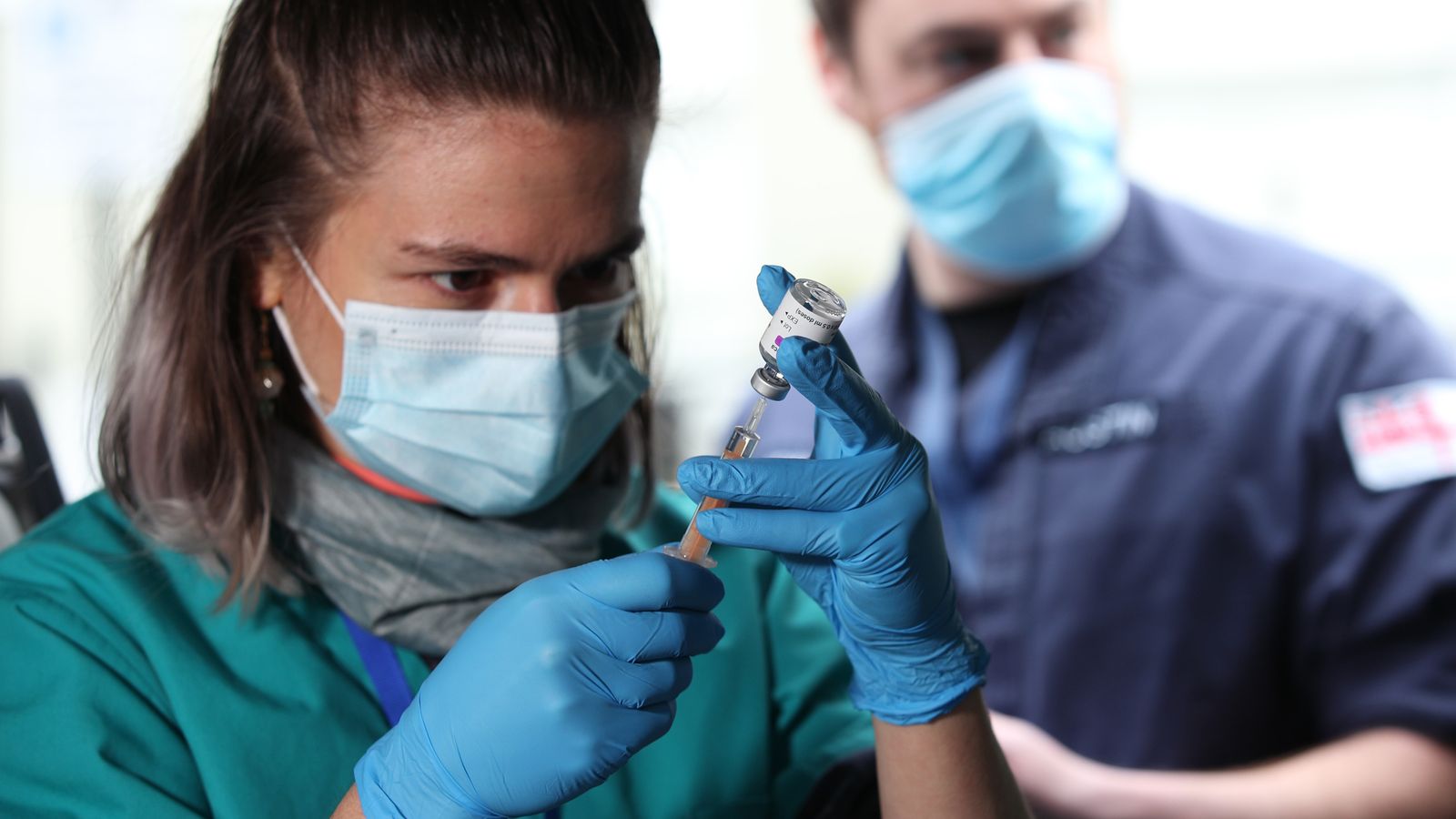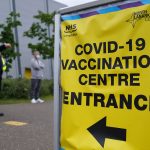The decision not to prioritise COVID-19 vaccinations for groups such as police and teachers has been described as a “deep and damaging betrayal” which “will not be forgotten”.
The government has announced people aged 40-49 will be the next in line to get a coronavirus vaccine after all vulnerable groups and the over-50s are covered.
Live COVID updates from the UK and around the world
The Joint Committee on Vaccination and Immunisation (JCVI) said this plan would provide “the greatest benefit in the shortest time”.
But earlier this week, Metropolitan Police commissioner Dame Cressida Dick said she felt “extremely disappointed” that officers had not been prioritised.
And on Friday, the national chairman of the Police Federation of England and Wales added his opposition.
John Apter told the PA news agency: “There’s real palpable anger from all levels within policing about how we have been completely disregarded and ignored in this phase.
“What is expected of policing does put them at risk. It does put them at risk of transmitting this virus.
“They’re being spat at, coughed at, rolling around on the ground with people, working in hospital environments, going into people’s homes. They can’t mitigate the risk of the virus.
“All of that means absolutely nothing. This is a very deep and damaging betrayal and it will not be forgotten.”
Please use Chrome browser for a more accessible video player
Paul Whiteman, general secretary of school leaders’ union Naht, said school teams “often occupy confined and unventilated spaces for long periods of time with only rudimentary PPE (personal protective equipment)”.
“The fact that it may have added some complexity to rollout is not a good enough reason not to prioritise the needs of committed professionals,” he said.
“A sick teacher is a teacher away from class, which will mean further disruption to pupils’ education and could well mean that they may need to be educated from home again.
“I am amazed by the continuing dedication of school teams. The government has let them down at every turn.”
Please use Chrome browser for a more accessible video player
In a statement, a government spokesperson confirmed all four nations of the UK would follow the recommendations “subject to the final advice given by the independent expert committee”.
The spokesperson added that age had been assessed to be “the strongest factor linked to mortality, morbidity and hospitalisations, and because the speed of delivery is crucial as we provide more people with protection from COVID-19“.
Therefore, the priority ordering for phase two will be:
It will begin after all nine priority groups and the over-50s have been offered the jab.
Professor Wei Shen Lim, the COVID-19 chair for JCVI, said age “remains a dominant factor” and that making this a priority would also make the programme more “simple”.
He added: “Simplicity has been a cornerstone in terms of speed and success.
“An occupation-based vaccination programme has never been tested; trying to switch will be more complex and potentially introduce more delays into the programme.
“The vaccination programme is a huge success and continuing the age-based rollout will provide the greatest benefit in the shortest time, including to those in occupations at a higher risk of exposure.”
The decision has been backed by a number of scientists including Jonathan Ball, professor of molecular virology at the University of Nottingham.
He said: “We know that these vaccines are good at protecting from serious disease, and the likelihood of that increases with age.
“Therefore, continuing to target vaccine rollout according to disease risk makes sense, especially if this simplifies the rollout process.”
Currently, people in group five of the priority groups – anyone aged 65 and over – are being vaccinated.
Some areas have also moved on to group six – adults aged 16 to 64 with underlying health conditions.
A further 600,000 people who were identified last week as being at additional risk COVID-19 were invited to book a slot at a vaccination centre or pharmacy on Thursday.
Recently, the number of jabs administered has slowed, but Boris Johnson has maintains that all adults in the UK should be offered their first vaccination by 31 July.
He said everyone over 50 should get their offer by 15 April.
On Friday, the government spokesperson said the the UK “remained on course” to meet these targets, as the number of first jabs administered surpassed 19 million.
Analysis: Too risky to start mass immunisation by profession in the middle of a pandemic
By Ashish Joshi, health correspondent
Keep it simple. Keep it quick. That’s the government’s vaccination strategy. It’s worked so far and there is, as far as the JCVI is concerned, no reason to change it now.
They want as many people vaccinated as soon as possible and the easiest way to do that is to target sections of the population according to age.
By trying to break it down into occupations risks slowing down this monumental effort and undoing all the good work so far.
The mission, right from the very start, is to stop people dying, to stop people becoming very sick and to stop people needed hospital treatment.
The data, say the government’s scientists, tells us that is happening. They argue that to move from target age groups to high-risk occupations is too complicated.
And we know that age and underlying health conditions are the two most important factors. The older the patient then the higher the risk from COVID-19. That’s why phase one of the rollout targeted the over-50s and the most clinically vulnerable. The next phase will be those aged 40-49.
Another argument is that by hitting this age group you also take in public workers like teachers and police officers who are most at risk by age.
The next phase will start as soon as the first one is over. But significant concerns remain about low vaccine take-up in certain communities like black and Asian; travellers; and Eastern European. The reasons are varied and complex but that is the challenge for public health workers to engage more with these groups and ensure access and counter the misinformation that exists.
This country has never undertaken a mass immunisation programme according to profession. It is too risky to start one in the middle of a deadly pandemic.






















